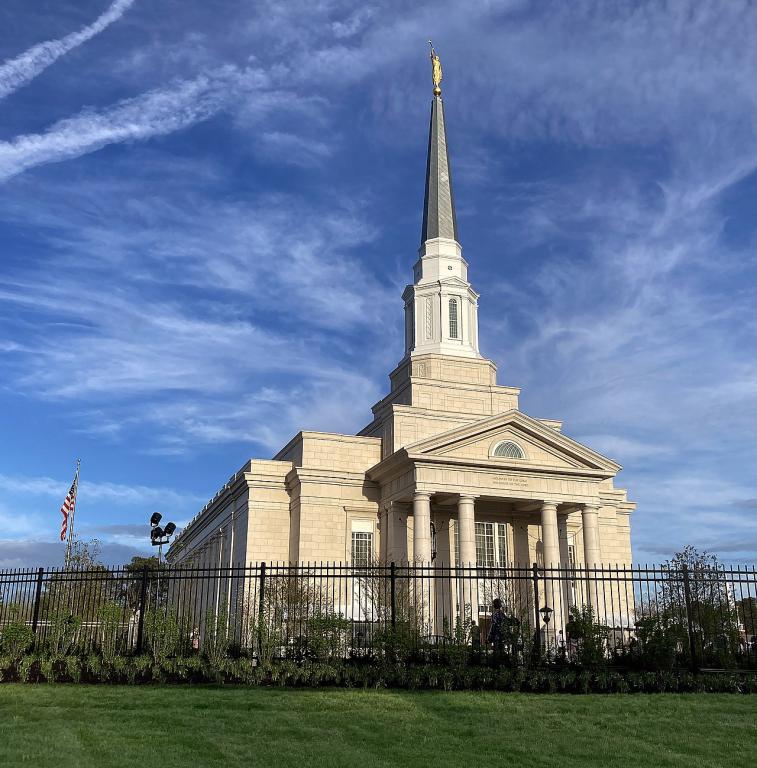
(Wikimedia Commons public domain image)
We had hoped to be able to take in a session at the still relatively new Richmond Virginia Temple, but it seems that our schedule — coupled with the cold that I came down with on the flight from Denver to here (I could almost give you the precise minute that it hit me) — won’t permit that. However, in partial compensation, we were surprised to have a nice, clear view of the temple, albeit a somewhat distant one, during our approach to Richmond International Airport. It pleases me no end that there is now a temple here. Previously the large temple north of the Washington DC beltway and the small temple in Raleigh, North Carolina, were roughly equidistant from Richmond, and the traffic (particularly between Richmond and the District of Columbia) can be horrific.

As one critic confidently predicted back near our founding in August 2012, the Interpreter Foundation has been essentially moribund since December of that year. Here are six items that apparently have not appeared on the Foundation’s website over the past couple of days. Consider them the sound of silence:
Conference Talks: The Original English of the Book of Moses and What It Indicates about the Book’s Authorship (2021 Tracing Ancient Threads in the Book of Moses Conference), presented by Stanford Carmack
Stanford Carmack spoke at the 2021 Tracing Ancient Threads in the Book of Moses Conference on Saturday, April 24, 2021.
About 72 percent of the language of the Book of Moses is original, independent of Genesis language (nearly 8,900 words). In this preliminary linguistic analysis, I investigate quite a few syntactic and lexical features, comparing usage to that of the King James Bible, the Book of Mormon, pseudobiblical texts, Joseph Smith’s own native preferences, and the greater textual record. Aspects of the nonstandard grammar are considered as well.
Interpreter Radio Show — May 12, 2024
For the 12 May 2024 episode of the Interpreter Radio Show, our regular hosts — Terry Hutchinson, John Gee, Kevin Christensen, and Mark Johnson — were joined by special guest Gregory Steven Dundas. They discussed Come, Follow Me Book of Mormon lesson 23 and Greg’s new book, Mormon’s Record: The Historical Message of the Book of Mormon.
Their conversation was recorded, shorn of commercial interruptions, and archived, and it has now been made available to you for your listening pleasure. The “Book of Mormon in Context” portion of this show, for the Come, Follow Me Book of Mormon lesson 23, will also be posted separately on Tuesday, May 28.
The weekly Interpreter Radio Show can be heard on Sunday evenings from 7 to 9 PM (MDT), on K-TALK, AM 1640, or, if that doesn’t float your boat or isn’t available to you, it can also be heard live on the Internet at ktalkmedia.com.
The Book of Mormon in Context Lesson 22: “They Were Called the People of God” (Mosiah 25-28)
On the 5 May 2024 Come, Follow Me installment of the Interpreter Radio Show, Spencer Kraus, Hales Swift, Brent Schmidt, and Martin Tanner came together to discuss Book of Mormon lesson 22, “They Were Called the People of God” covering Mosiah 25-28.
Their discussion is now available to you online. The other segments of their 5 May 2024 radio show can be accessed at https://interpreterfoundation.org/interpreter-radio-show-may-5-2024.
This week, we have lectures 39 through 41 from Hugh Nibley’s Book of Mormon classes at Brigham Young University, covering Mosiah 23-29.
During 1988, 1989, and 1990, Hugh Nibley taught Honors Book of Mormon classes for four semesters at Brigham Young University. The lectures were video-taped and audio cassettes and printed transcripts were made of the lectures. We believe these recordings will be interesting to listen to and valuable to your Come, Follow Me study program this year. Each week, we will include the lectures covering the Book of Mormon chapters being studied that week.
Editor’s Note: Four years ago, Jonn Claybaugh began writing the Study and Teaching Helps series of articles for Interpreter. We now have these wonderful and useful posts for all four years of Come, Follow Me lessons. Beginning this year we will be reposting these articles, with dates, lesson numbers, and titles updated for the current year’s lessons. Jonn has graciously agreed to write new study aids for those lessons that do not directly correspond to 2020 lessons.
Hugh Nibley Observed: “Hugh Nibley, Mentor to the Saints,” presented by C. Wilfred Griggs
“I would like to establish the context for a consideration of Hugh Nibley as a mentor by turning back the calendar to an earlier time. Although the comparison I wish to make does not match up in every detail, I believe the similarities justify placing Nibley alongside a noteworthy savant from another era. It will be for you to decide whether I am right.”
Part of our book chapter reprint series, this article originally appeared in Hugh Nibley Observed, edited by Jeffrey M. Bradshaw, Shirley S. Ricks, and Stephen T. Whitlock. For more information, go to https://interpreterfoundation.org/books/hugh-nibley-observed/.

Video and other material located in the Christopher Hitchens Memorial “How Religion Poisons Everything” File™ shows a prominent French-born Latter-day Saint leader recently, openly, and (it must be said) shamelessly admitting some of the crimes that he and his group of unrepentant theists have recently been committing against humanity. If you want to feel righteously indignant — and I know that, for some of you, this is an important priority — his remarks will serve you well: “Why Is Utah Thriving? Look to Latter-day Saint Pioneer Values, Presiding Bishop Says: The Church leader speaks to leaders gathered for an international trade summit in Salt Lake City”
Posted from Richmond, Virginia












